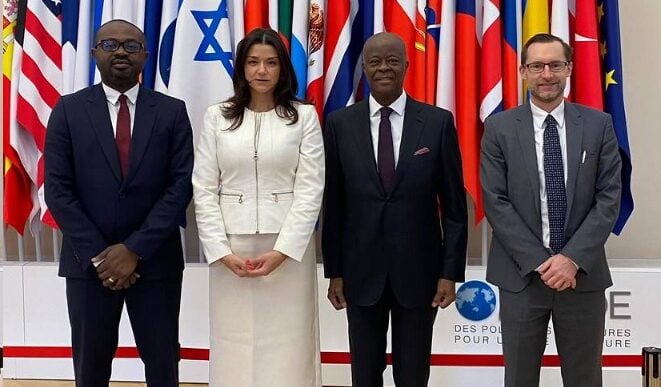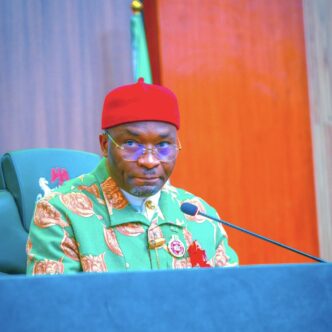BY AYOTUNDE ABIODUN
Imagine a football match where the referee suddenly drops the whistle, picks up the ball, and starts playing striker. Absurd, right? Yet this is precisely what Nigeria is about to do with its oil industry. A proposed amendment to the Petroleum Industry Act threatens to hand the country’s upstream regulator the power to negotiate contracts, evaluate costs, and represent government interests in deals worth billions of dollars, while still expecting it to referee disputes impartially. For an economy that earns the bulk of its export revenues from oil, this is not just a bad policy move; it is a gamble with Nigeria’s fiscal future at a time when the country can least afford it.
The Petroleum Industry Act (Amendment) Act 2025, currently before the national assembly, would fundamentally reshape how Nigeria governs its oil sector. The most consequential change: the Nigerian Upstream Petroleum Regulatory Commission (NUPRC) would replace NNPC Limited as the government’s representative in all production-sharing, profit-sharing, and risk service contracts. NUPRC would negotiate new model contracts, evaluate work programs, verify costs for cost recovery, and essentially become both player and referee in the upstream sector.
Simultaneously, the amendment would concentrate NNPC’s ownership exclusively in the Ministry of Finance Incorporated (MOFI), ousting the Ministry of Petroleum Incorporated (MOPI) as a co-equal shareholder. Section 53 of the PIA would be rewritten to vest all shares in the NNPC Limited with the MOFI as “the sole bare agent of the Federation.” This consolidation would strip NNPC’s board of the strategic and budgetary powers that were central to its transformation into a commercial entity, placing the company under direct finance ministry control.
Advertisement
The government’s frustration is understandable. The NNPC has long been criticised for opacity, from questionable deductions to under-remittance of oil proceeds. Recent reports showing missing dividends and underwhelming profit oil contributions have fueled the perception that the company is more beholden to itself than to the federation. Attorney General Lateef Fagbemi has justified the amendment by pointing to “statutory leakages and opaque deductions” that weaken government revenues at a time of mounting fiscal strain. The temptation to claw back control is strong with debt service consuming the bulk of federal income. However, in trying to correct one problem, the proposed amendment risks creating a graver one: collapsing the essential boundary between oversight and participation that underpins credible oil governance worldwide.
In every mature oil economy, roles are separated for good reason. The state establishes a commercial entity to represent its interests in contracts. Regulators enforce the rules, monitor compliance, and safeguard transparency. Norway’s Equinor negotiates and partners in projects while the Norwegian Petroleum Directorate regulates. In Brazil, Petrobras operates commercially while the Agência Nacional do Petróleo, Gás Natural e Biocombustíveis (ANP) regulates. Angola separates Sonangol’s commercial role from its national regulator. This division is not cosmetic. It creates accountability, prevents conflicts of interest, and reassures investors that there is a level playing field. When disputes arise over compliance, as they inevitably do, an independent regulator can adjudicate impartially. But how credible will NUPRC be if it is simultaneously a party to the very contracts under scrutiny? How can it fairly resolve disagreements between itself as concessionaire and international oil companies? The answer is simple: it cannot.
Nigeria cannot afford to ignore investor perceptions. Oil majors have already been trimming their exposure to Nigerian assets, citing insecurity, regulatory uncertainty, and the global pivot to cleaner energy. Divestment from onshore and shallow-water fields has accelerated, with independents and local players stepping in but often lacking the capital depth to sustain production. For investors, predictability matters as much as geology. An independent regulator provides reassurance. A regulator simultaneously negotiating contracts introduces uncertainty and raises red flags about impartiality in enforcement or arbitration. Global capital is mobile—Angola, Guyana, and Namibia offer transparent regulatory frameworks that separate commercial and regulatory functions. The proposed amendment signals a willingness to prioritise short-term fiscal gains over robust corporate governance, creating persistent risk that could erode investor confidence and threaten the sector’s long-term stability.
Advertisement
The amendment also strikes at NNPC’s fragile corporate transformation. The PIA was celebrated for converting NNPC into a limited liability company with a board empowered to approve budgets, set strategy, and pursue commercial discipline. This was Nigeria’s attempt to replicate the success of national oil companies like Equinor or Petronas, which thrive as competitive players on the global stage. Now, that progress is in jeopardy. By ousting the MOPI as a co-equal shareholder and concentrating all ownership in MOFI as “the sole bare agent of the Federation,” the amendment removes the sectoral expertise that MOPI brought to NNPC’s governance.
More critically, it transfers strategic and operational control to the finance ministry, a body primarily concerned with revenue extraction rather than long-term sectoral development. This risks reducing NNPC once again to a politically managed entity—a cash cow for the treasury rather than a competitive commercial enterprise. Placing the NNPC under direct finance ministry control renders its board functionally redundant. In mature oil economies, boards serve as the highest strategic organ, insulated from day-to-day political pressures. When finance ministry appointees dictate strategic choices, from portfolio decisions to refinery investments to exploration priorities, the NNPC loses the autonomy essential for competing with Saudi Aramco, Petrobras, or other global players. Instead of deepening its corporate ethos, the change would drag NNPC back into the orbit of state control, just when it was beginning to find its footing as a commercially credible enterprise.
But Nigeria’s fiscal predicament is real, and doing nothing is not an option. The answer, however, is not to re-politicise oil governance or blur regulatory lines. What Nigeria needs is stronger transparency and accountability, not structural regression. A more measured approach would involve strengthening independent audits with results published within 30 days, mandating real-time public reporting of production-sharing contract proceeds on accessible platforms, and linking executive compensation directly to remittance compliance to create personal accountability for revenue delivery. The Extractive Industries Transparency Initiative could be expanded to include regular reconciliation of NNPC contract proceeds against federal accounts with civil society oversight. Given that the Federal High Court already has jurisdiction over matters relating to government revenue and the operations of the petroleum sector, the focus should be on designating specialised divisions or fast-track panels within it to handle remittance disputes efficiently and impose swift, enforceable penalties for non-compliance.
Such penalties could include the imposition of statutory interest on delayed payments, court orders compelling immediate remittance to the Federation Account, and personal sanctions against responsible NNPC officials for persistent non-compliance. Administratively, the ministry of finance and NEITI could suspend executive bonuses or refer repeat offences to the Code of Conduct Bureau, while MOFI, as a shareholder, could tie management contract renewals and compensation to verified remittance performance. Public disclosure of sanctions through a revenue compliance dashboard would further strengthen deterrence by ensuring that fiscal accountability carries not only legal but also reputational consequences.
Advertisement
China’s state-owned assets supervision and administration commission has overseen governance improvements across large state enterprises through enhanced internal audits and accountability systems, all while maintaining its supervisory rather than operational role. Globally, regulators rarely assume commercial roles; reforms typically combine independent oversight, transparency, and judicial enforcement to hold state-owned enterprises accountable without compromising regulatory neutrality.
Nigeria faces a stark choice. It can strengthen the reforms enshrined in the PIA, build investor confidence, and align with international best practice by ensuring clean separation of roles. Or it can retreat into a system where the regulator is both player and referee, undermining credibility and risking capital flight. This is not merely a technical amendment. It is a signal of Nigeria’s governance trajectory. Will the country stay the course of reform, or will it relapse into opaque, politically managed structures?
The National Assembly must reject this amendment and instead mandate quarterly independent audits of NNPC remittances, establish petroleum revenue transparency standards, and strengthen judicial mechanisms for enforcement. The PIA took two decades to pass because Nigeria needed to get oil governance right. Civil society and the media must demand transparency, monitor the amendment’s progress through the legislative process, and organise town halls in oil-producing communities to educate Nigerians about what is at stake. The international community and investors must make their concerns known—investment decisions made in the next 12 months will signal whether Nigeria’s governance backslide has consequences.
In oil governance, as in life, shortcuts prove costly. Nigeria must resist the temptation of a quick fix and instead deepen the hard-won reforms that the PIA represented. The answer will shape not just the fortunes of NNPC and NUPRC but the country’s fiscal health for decades. Anything less would betray the promise of transparency and accountability that Nigerians were told the Petroleum Industry Act would deliver.
Advertisement
Ayotunde Abiodun is an analyst at SBM Intelligence
Advertisement
Views expressed by contributors are strictly personal and not of TheCable.












